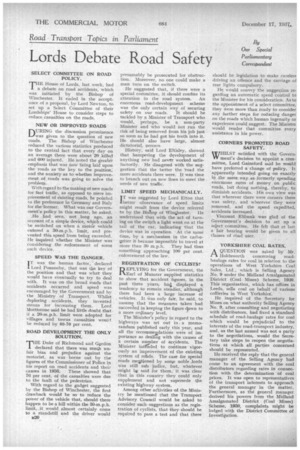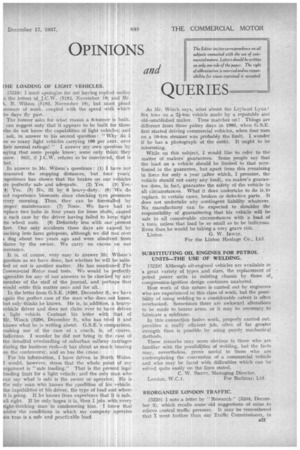Lords Debate Road Safety
Page 20

Page 21

If you've noticed an error in this article please click here to report it so we can fix it.
SELECT COMMITTEE ON ROAD POLICY.
THE House of Lords, last week, had 1 a debate on road accidents, which was initiated by the Bishop of Winchester. It ended in the acceptance of a proposal, by Lord Newton, to set up a Select Committee of their Lordships' House to consider steps to reduce casualties on the roads.
NEW OR IMPROVED ROADS DURING the discussion prominence Lwas given to the question of new roads. The Bishop of Winchester reduced the various statistics produced to the central fact that every day on an average there were about 20 killed and 600 injured.' He ricked the greaier emphasis that was now being laid upon the roads as the key to the position; and the anxiety as to whether improvement,of roads was going to solve the
problem:. •
With regard to the Making of new roads for fast traffic,. as opposed to Mere improvement of existing roads, he pointed to the preference in Germany and Italy for the -former. What was our Government's policy. in this matter he asked. • .fie . had seen, not Jong ago, an account of a simple device, which could be switched on when a motor vehicle entered a 30-m.p.h. limit, and prevented this speed from being exceeded. He inquired whether the Minister was considering the enforcement of some such -device.
SPEED WAS THE DANGER.
IT was the human factor; declared
Lord Ponsonby, that was the key of the position and that was what they would have eventually to try to deal with. It was on the broad roads that accidents occurred and speed was encouraged by the Government and by the Ministry of Transport. Whilst deploring . accidents, they invented means for increasing them. Lord Mottistone said he had little doubt that if a 20-m.p.h. limit were adopted for villages and towns casualties would be reduced by 60-70 per cent.
ROAD DEVELOPMENT THE ONLY SOLUTION.
THE Duke of Richmond and Gordon declared that there was much unfair bias and prejudice against the motorist, as was borne out by the figures of the Commissioner of Police in iris report on road accidents and -their causes in 1936. These showed that 76 per cent, of the casualties were due to the fault of the pedestrian.
With regard to the gadget suggested by the Bishop of Winchester, the first drawback would be so to reduce the power of the vehicle that, Should there happen to be a hill within the 30-mph. limit, it , would almost certainly come to a standstill and the driver would BO presumably be prosecuted for obstruction, Moreover, no one could make a man turn on the switch.
He suggested that, if there were a special committee, it should confine its attention to the road system. An enormous road-development scheme was the only certain way of securing safety on our roads. It should be tackled by a Minister of Transport who would, perhaps, be a non-party Minister and who would not run the risk of being removed from his job just so soon as he had got his teeth into it.' He should also have large, almost dictatorial, powers.
History, said Lord Eltisley, showed that hampering the development of anything new had never worked satisfactorily. • He disagreed with the suggestion that the better the 'road the more accidents there were. It was time to branch out on new lines to meet the needs of new traffic.
LIMIT SPEED MECHANICALLY.
I T was suggested by Lord Elton that better observance of speed limits might result from the device referred to by the Bistop of Winc,hestet. He understood that with the act of turning on the switch a light went on at the tail of the car, indicating that the device was in operation. At the same time, by a mechanism in the carbuketter it became impossible to travel at more than 30 m.p.h. They had thus something approaching 100 per cent: enforcement of the law.
REGISTRATION OF CYCLISTS?
REPLYING for the Government., the Earl of Munster supplied statistics to show that accident figures, in the past three years, ha 4 displayed a tendency to remain steadier, although there had been a large increase of vehicles. It 'vas only fair, he said, to assume that the measures taken had succeeded in keeping the figure down to a more ordinary level.
The Minister's policy in regard to the highways was set out in. a memorandum published early. this year, and all the recommendations were of importance as dealilig with the causes of a certain number of accidents. The Minister intrnded to continue vigorously an imprOvement of the existing system of rods. The case for special roads meationed by some noble .lords was still sub judice, but, whatever might bo said for them, it was clear that in this country they could only supplement and not supersede the existing highway system.
Among other aCtivities of the Ministry he mentioned that the Transport Advisory Council would be asked to consider such suggestions as the registration of cyclists, that they should he required to pass a test and that there should be legislation to make careless driving an offence and the carriage of rear lights compulsory. • He would convey the suggestion regarding an automatic speed control to the Minister for his consideration. As to the appointinent of a select committee, they were more than ready to consider any further steps for reducing danger on the roads which human ingenuity or experience could suggest. The Minister would fender that committee every assistance in his power.
CORNERS PROMOTED ROAD SAFETY.
lyp-ms-r satiSfied with the GovernYY rnent's decision to appoint a committee, Lord Gainsford said he would have preferred a change of policy. It apparently intended going on exactly in the sameway. as formerly spending enormous sums of money on public roads, but doing nothing, thereby, to diminish accidents. His own view was that wherever there were corner's there was safety, and wherever they were removed, and the speed expedited, accidents increased.
Viscount Elibank was glad of the Government's decision to set up a select committee. He felt that at last a fair hearing would be given to all 'Classes of riiad user.
YORKSHIRE COAL RATES.
AQUESTION was asked by Mr. oldsworth concerning roadhaulage rates for coal in relation to the operations of West Yorkshire Coal Sales, Ltd., which is Selling Agency No. 9 under the Midland Amalgamated District (Coal Mines) Scheme, 1930. This organization, which has offices in Leeds, sells coal on behalf of various collieries in West Yorkshire.
He inquired of the Secretary for Mines on what authority Selling Agency No. 9, after consulting and negotiating with distributors, had fixed a standard schedule of road-haulage rates for coal which would be prejudicial to the interests of the road-transport industry, and, as the last named was not a party to the negotiations, would the Secretary take steps to reopen the negotiations at which all parties concerned should be represented.
He received the reply that the general manager of the Selling Agency had come to an agreement with the coal distributors regarding rates in connection with the determination of coal prices. It was open to representatives of the transport interests to approach the general manager in the matter. Furthermore, as the general manager derived his powers from the Midland Amalgamated District (Coal Mines) Scheme, 1930, complaints might be lodged with the District Committee of Investigation.
1HE LOADING OF LIGHT VEHICLES.
[5218] I must apologize for not having replied earlier o the letters of J.C.W. (5192, November 19) and Mr. R. Wilson (5193, November 19), but must plead -iressure of work, coupled with the speed with which he days fly past.
The former asks for what reason a 6-former is built. . can suggest only that it appears to be built for those vho do not know the capabilities of light vehicles; and : ask, in answer to his second question : "Why do I iee so many light vehicles carrying 100 per cent, over heir normal ratings? " I answer my own question by laying that some people 'mow; some only think they mow. Still, if J.C.W. refuses to be convinced, that is hat.
In answer to Mr. Wilson's questions : (I) I have not ileasured the stopping distances, but four years.: mperience has shown that the brakes on our vehicles
ire perfectly safe and adequate. (2) Yes. (3) Yes.:4) Yes. (-5) No, 32 by 6 heavy-duty. (6)We do not experience blowouts since checking tyre. pressures very morning. Thus, they can be forestalled by ?roper maintenance. (I) None. We have had to replace two hubs in four years for loose studs, caused .n each case by the driver having failed to keep tight
:he wheel nuts. (8) Definitely less with our present fleet. Our only accidents these days are caused by backing into farm gateposts, although we did run over dog about two years ago and were absolved from blame by the owner. We carry no excess on our insurance.
It is, of course, very easy to answer Mr. Wilson's question as we have done, but whether he will be satisfied or not is another matter. He has mentioned The Commercial Motor road tests. We would be perfectly agreeable for any of our answers to be checked by any member of the staff of the journal, and perhapsthat would settle this matter once and for all.
In the letter from G.S.E. (5205, December 3), we have again the perfect case of the man who does not know, hut only thinks he knows. He is, in addition, a heavyvehicle driver and does not claim ever to have driven a light vehicle. Contrast his letter with that of Mr. Winch (5206, December 3), who has tried it and knows what he is writing about. G.S.E.'s comparison, making use of the case of a coach, is, of course, ludicrous. I wonder he did not bring in the case of the dreadful overloading of suburban railway carriages during the business rush—it has about as much bearing on the controversy, and so_ has the crane.
For his information, I have driven in North Wales. I would, however, stress that the whole point of my argument is "safe loading." That is the present legal loading limit for a light vehicle; and the only man who can say what is safe is the owner or operator. He is the only man who knows the condition of his vehicle, the Capabilities of his driver, the type of load and where it is going. If he knows from experience that it is safe, all right. If he only hopes it is, then I join with every right-thinking man in condemning him. I know that under the conditions in which my company operates six tons is a safe and practicable load.




























